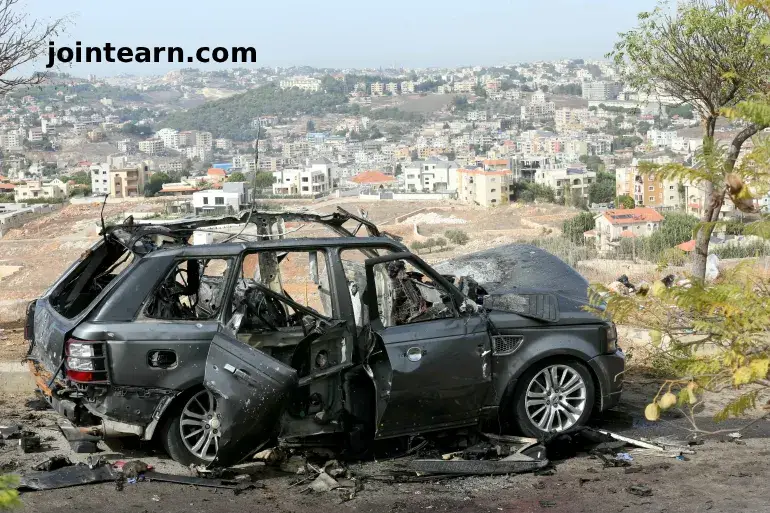
Tensions are rising once again on the Lebanese-Israeli border as an Israeli airstrike claimed the lives of at least four individuals in southern Lebanon on Saturday, raising serious concerns about the stability of the nearly year-old ceasefire agreement between Israel and Hezbollah.
According to the Lebanese Ministry of Public Health, the attack took place in the town of Kfarsir, located in the Nabatieh district. In addition to the four fatalities, at least three others suffered injuries, further escalating already fragile relations between the two long-standing regional adversaries.
Details of the Attack
The Lebanese state-run National News Agency reported that the strike occurred at approximately 2:15pm local time (16:15 GMT) and involved a “guided missile” fired by Israeli forces. The missile reportedly targeted a civilian vehicle, leaving behind a scene of devastation and twisted metal in the rural border area.
Images from the aftermath show the wrecked car lying on the roadside, testimony to the sudden violence that shattered the region’s relative calm. The victims of the attack have not yet been publicly identified.
Ceasefire Under Strain
The latest strike comes amid increasing tensions between Israel and Lebanon, despite a ceasefire agreement brokered in November 2024 between Israel and Hezbollah, the powerful Lebanese armed group. That truce followed a year of intense cross-border fighting that erupted in late 2023 when Hezbollah launched rocket attacks into northern Israel, in solidarity with Palestinians in Gaza after the October 7 Hamas-led assault in southern Israel.
Although the ceasefire initially reduced hostilities, Israel has since maintained troops in five key zones across southern Lebanon and has carried out regular air raids, often citing the presence of Hezbollah operatives as justification. However, these attacks have not been limited to combatants.
According to United Nations data, at least 111 Lebanese civilians have been killed by Israeli forces since the ceasefire came into effect—including journalists, medics, and non-combatants. Lebanese authorities and international observers have repeatedly warned that such actions may constitute ceasefire violations and undermine peace efforts in the region.
Diplomatic Fallout and Lebanese Response
Just one day before the deadly airstrike, Lebanese President Joseph Aoun publicly accused Israel of escalating tensions in response to his call for renewed negotiations aimed at securing a more durable peace. In mid-October, Aoun had advocated resuming diplomatic talks with Israel to formally end cross-border attacks and address issues surrounding Israeli military presence in Lebanese territory.
“Our proposal is clear,” Aoun stated. “We seek to end the Israeli occupation and bring lasting peace to southern Lebanon.”
Israel, however, has claimed that Lebanon has failed to uphold its side of the ceasefire by not dismantling Hezbollah’s military capabilities. The armed group, known for its opposition to Israel, firmly rejects any demand to demilitarize, calling it an infringement on Lebanese sovereignty.
Amid rising fears of renewed conflict, Aoun earlier this week instructed Lebanon’s armed forces to confront any new Israeli incursions. This order came after Israeli forces stormed the border town of Blida, where they reportedly killed a municipal worker, Ibrahim Salameh, who had been asleep inside a government building. The Israeli military claimed soldiers had encountered an “immediate threat” but provided no evidence for the allegation.
What’s Next?
The situation along the Israel-Lebanon border appears increasingly precarious. While both sides had stepped back from open conflict under the Trump-brokered ceasefire, recent developments threaten to reignite a full-scale confrontation that could plunge the region back into violence.
The international community, including United Nations peacekeeping forces in Lebanon, continues to urge restraint and dialogue. However, unless the terms of the ceasefire are reinforced or renegotiated, the cycle of violence could deepen, with devastating consequences for civilians on both sides.


Leave a Reply